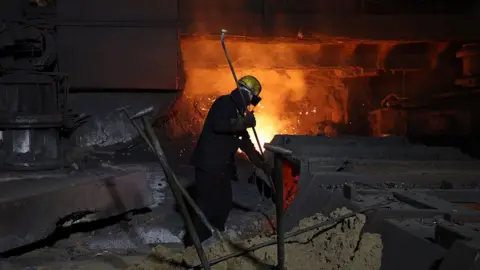The recent tariff agreement between the United Kingdom (UK) and the United States (US) has stirred significant dialogue and controversy, especially regarding its implications for China. The UK government has forcefully countered assertions that this deal could negatively affect China’s trade interests. In particular, the UK’s representatives assert that the agreement encompasses no provisions that would effectively veto Chinese investments.
This new UK-US agreement marks a significant rollback of the heightened tariffs originally imposed by former President Donald Trump on various goods, including metals and automobiles. However, the deal comes with stringent stipulations, notably obligating the UK to comply with US demands surrounding the security of supply chains for steel and aluminum products exported to America. These conditions have provoked concerns from Beijing, which views them as a potential infringement that could limit its role in supplying goods intended for the US through UK channels. A spokesperson for the Chinese government has characterized it as a violation of a “basic principle” in trade agreements, which is that they ought not to target or harm third-party nations.
During a regular press conference, Chinese foreign ministry spokesperson Lin Jian specifically commented on the UK’s trade agreements with the US and India. Lin emphasized the principle of respect in international relations, asserting that cooperation should not come at the expense of other nations’ interests. This reiteration from China highlights the sensitivity regarding international trade dynamics and the perception of competitive diplomacy.
China, as the world’s second largest economy and the UK’s fifth largest trading partner, had engaged in trading activities amounting to a substantial £98.4 billion in 2024. In response to the concerns about the UK’s dealings with the US, British officials have defended their agreement, asserting it prioritizes UK national interests, job security in crucial sectors, and a pathway for enhanced trade relations in the future. The government has responded to fears surrounding external influences by clarifying they do not intend to undermine beneficial economic relations with any third country, including China. The Chief Secretary to the Treasury emphasized that there was no “veto” on Chinese investment concerning this trade deal.
This agreement allows the continuation of Trump’s 10% blanket tariffs on many imports from countries worldwide, which still apply to a majority of UK goods entering the US. Nonetheless, the potential benefits are apparent in how tariffs on specific UK exports, notably steel and aluminum, have either been reduced or removed altogether. Additionally, the agreement stipulates the UK will expedite compliance with US requirements concerning the security of its steel and aluminum supply chains heading to the United States.
The context surrounding the trade negotiations adds layers to the situation. Since the start of 2023, the US and China have been embroiled in a tit-for-tat tariffs war. Historically, the US has imported significantly more from China, with imports valued at approximately $440 billion compared to exports of just $145 billion, causing dissatisfaction within the American administration. Donald Trump had, in part, justified the escalation of tariffs as a strategy aimed at promoting domestic consumption of American-made products, augmenting tax revenues, and boosting local job creation.
Recent developments indicated a turn in the trade environment, as Trump announced a “total reset” of trade relations between the US and China, aiming to reduce or suspend tariffs imposed reciprocally. Following negotiations, it was reported that US tariffs on Chinese imports could decrease from 145% to 30%, while China would similarly lower its tariffs on US imports from 125% to 10%. This move seems poised to mitigate escalating tensions and further solidify international economic relations.
The current climate reflects the intricate interplay of international trade, national interests, and the strategic positioning of countries like the UK and China in a rapidly evolving global economic landscape.



